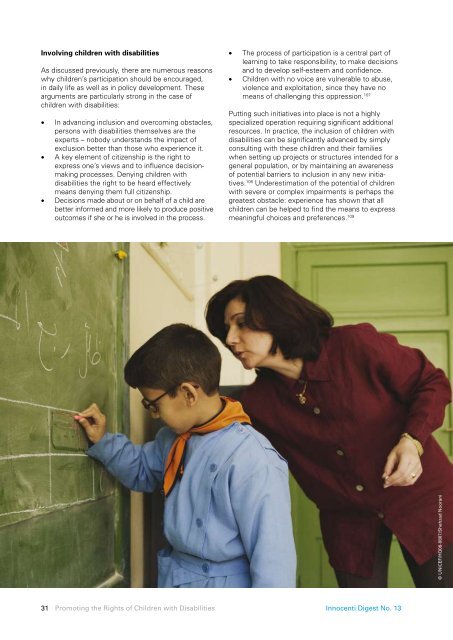Involving children <strong>with</strong> disabilitiesAs discussed previously, <strong>the</strong>re are numerous reasonswhy children’s participation should be encouraged,in daily life as well as in policy development. Thesearguments are particularly strong in <strong>the</strong> case <strong>of</strong>children <strong>with</strong> disabilities:• In advancing inclusion and overcoming obstacles,persons <strong>with</strong> disabilities <strong>the</strong>mselves are <strong>the</strong>experts – nobody understands <strong>the</strong> impact <strong>of</strong>exclusion better than those who experience it.• A key element <strong>of</strong> citizenship is <strong>the</strong> right toexpress one’s views and to influence decisionmakingprocesses. Denying children <strong>with</strong>disabilities <strong>the</strong> right to be heard effectivelymeans denying <strong>the</strong>m full citizenship.• Decisions made about or on behalf <strong>of</strong> a child arebetter informed and more likely to produce positiveoutcomes if she or he is involved in <strong>the</strong> process.• The process <strong>of</strong> participation is a central part <strong>of</strong>learning to take responsibility, to make decisionsand to develop self-esteem and confidence.• <strong>Children</strong> <strong>with</strong> no voice are vulnerable to abuse,violence and exploitation, since <strong>the</strong>y have nomeans <strong>of</strong> challenging this oppression. 107Putting such initiatives into place is not a highlyspecialized operation requiring significant additionalresources. In practice, <strong>the</strong> inclusion <strong>of</strong> children <strong>with</strong>disabilities can be significantly advanced by simplyconsulting <strong>with</strong> <strong>the</strong>se children and <strong>the</strong>ir familieswhen setting up projects or structures intended for ageneral population, or by maintaining an awareness<strong>of</strong> potential barriers to inclusion in any new initiatives.108 Underestimation <strong>of</strong> <strong>the</strong> potential <strong>of</strong> children<strong>with</strong> severe or complex impairments is perhaps <strong>the</strong>greatest obstacle: experience has shown that allchildren can be helped to find <strong>the</strong> means to expressmeaningful choices and preferences. 109© <strong>UNICEF</strong>/HQ06-0807/Shehzad Noorani31 <strong>Promoting</strong> <strong>the</strong> <strong>Rights</strong> <strong>of</strong> <strong>Children</strong> <strong>with</strong> <strong>Disabilities</strong> Innocenti Digest No. 13
7 ENSURING ASUPPORTIVEENVIRONMENTCreating a more inclusive society for all, and for children<strong>with</strong> disabilities in particular, requires a number<strong>of</strong> preconditions that combine to provide a supportiveenvironment for inclusion. These elements include:• <strong>the</strong> presence <strong>of</strong> local governance structures thatpromote children’s participation and <strong>the</strong> realization<strong>of</strong> children’s rights;• <strong>the</strong> introduction and development <strong>of</strong> laws andpolicies addressing disability issues;• mechanisms to permit persons <strong>with</strong> disabilitiesand <strong>the</strong>ir families to influence disability-relatedpolicies;• general and focused raising <strong>of</strong> awareness;• appropriate budgetary allocations;• adequate monitoring mechanisms to promoteand assess progress.Such a combined approach is critical to ensuring sustainablechange and to establishing <strong>the</strong> most effectivesupportive environments for children at all stages<strong>of</strong> <strong>the</strong> life cycle.Local governanceGood local governance pursues policy approachesguided by human rights and designed to promote <strong>the</strong>realization <strong>of</strong> fundamental rights and freedoms <strong>of</strong> allthose living under <strong>the</strong> jurisdiction <strong>of</strong> <strong>the</strong> local governmentauthorities. In this spirit, good local governancepromotes <strong>the</strong> mainstreaming <strong>of</strong> children’s rights inlocal plans, policies, institutions and budgets.In this respect, <strong>the</strong> Child Friendly Cities initiative promotes<strong>the</strong> consideration <strong>of</strong> <strong>the</strong> rights <strong>of</strong> <strong>the</strong> child asa distinct point <strong>of</strong> attention in planning, policy-makingand resource allocation, <strong>with</strong> children’s voices informing<strong>the</strong> democratic process. Child Friendly Cities areclassified as a “city, or any local system <strong>of</strong> governance,committed to fulfilling children’s rights.” 110These cities can be found throughout <strong>the</strong> world, <strong>with</strong>Bangkok, Buenos Aires, Chicago, Florence, MexicoCity and Mumbai as examples.A key feature <strong>of</strong> a Child Friendly City is that specialattention is given to disadvantaged and marginalizedchildren, including children <strong>with</strong> disabilities. In Canada,for example, <strong>the</strong> Society for <strong>Children</strong> and Youth <strong>of</strong>British Columbia is a fully fledged Child Friendly Cityprogramme that has given <strong>the</strong> issue <strong>of</strong> disability specialattention. 111A disability dimension can be introduced at city levelin a variety <strong>of</strong> ways:• by explicit incorporation <strong>of</strong> disability issues inlocal policy and planning;• by <strong>the</strong> promotion <strong>of</strong> projects to change publicattitudes and promote awareness <strong>of</strong> <strong>the</strong> rights <strong>of</strong>children <strong>with</strong> disabilities;• by <strong>the</strong> creation <strong>of</strong> neighbourhood or districtmaps developed in consultation <strong>with</strong> children<strong>with</strong> disabilities − which can help provide localgovernments and o<strong>the</strong>r agencies <strong>with</strong> a means topromote <strong>the</strong>ir rights and address <strong>the</strong>ir needs. 112Laws and policiesMany countries include in <strong>the</strong>ir Constitution specificprovisions referring to non-discrimination, but whilegender, ethnicity, race and religious beliefs are <strong>of</strong>tencited as grounds for protection, specific references todisability are less common. Since <strong>the</strong> 1980s, constitutionaland legislative changes in favour <strong>of</strong> persons<strong>with</strong> disabilities have been enacted in a number <strong>of</strong>countries, including Austria, Brazil, China, Finland,Germany, Malawi, <strong>the</strong> Philippines, South Africa,Uganda, <strong>the</strong> United Kingdom and <strong>the</strong> United States.Research shows that, across regions, 39 states haveadopted non-discrimination or equal opportunity legislationin <strong>the</strong> context <strong>of</strong> disability. 113These reforms have been based upon internationalhuman rights instruments, including <strong>the</strong> Conventionon <strong>the</strong> <strong>Rights</strong> <strong>of</strong> <strong>the</strong> Child. They were also influencedby <strong>the</strong> 1993 UN Standard Rules on <strong>the</strong> Equalization<strong>of</strong> Opportunities for Persons <strong>with</strong> <strong>Disabilities</strong> and <strong>the</strong>work <strong>of</strong> <strong>the</strong> Special Rapporteur on Disability. The newConvention on <strong>the</strong> <strong>Rights</strong> <strong>of</strong> Persons <strong>with</strong> <strong>Disabilities</strong>also requires a re-examination <strong>of</strong> legislation and policiesin all member States.A commitment to inclusive planning ensures thata disability dimension is clearly present in all policydevelopment, implementation and monitoring. To thisend, a useful toolkit has been developed and is availableonline. 114A good example <strong>of</strong> inclusive planning is provided bySouth Africa, where <strong>the</strong> promotion <strong>of</strong> inclusion forchildren <strong>with</strong> disabilities has been linked to broaderdevelopments such as <strong>the</strong> overall reform <strong>of</strong> <strong>the</strong>country’s education system and curriculum, and tochanges addressing <strong>the</strong> status <strong>of</strong> marginalized groupsInnocenti Digest No. 13<strong>Promoting</strong> <strong>the</strong> <strong>Rights</strong> <strong>of</strong> <strong>Children</strong> <strong>with</strong> <strong>Disabilities</strong>32
















